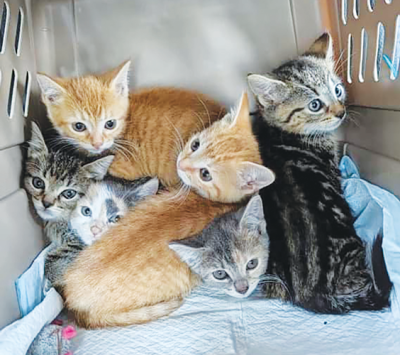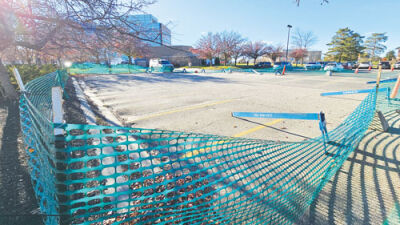
Tigerlily Cat Rescue is partnering with the city to trap, neuter, vaccinate and release or adopt the community cats in the city. These kittens were collected near Griggs Street and, along with many more, are available for adoption.
Photo provided by Tigerlily Cat Rescue
ROCHESTER — There’s “a cat problem” in the city’s neighborhoods, according to Councilwoman Sara King.
Specifically, near Griggs Street.
Cats, she said, have been known to roam certain neighborhood streets, making noise all hours of the night in the alleys.
King recently brought the issue to the attention of her fellow Rochester City Council members.
“There are cats everywhere,” she said.
Rochester Fire Chief John Cieslik confirmed that the city has been receiving complaints about feral cats “from several parts in the city.”
The city, he said, has decided to take action by creating a Cat Committee — which has met over the past few months to decide how to best stop the feral cats from multiplying.
City officials have since partnered with leaders of a few nonprofit rescue organizations, and spay and neuter clinics — including Cristen Alimario of Tigerlily Cat Rescue, Tara Tomczik-Husak of The Feline Fund, and Cheryl Lynn Phillips GG’s Foundation — to tackle the issue.
Cieslik said the most humane way to deal with the cat problem is TNVR — or trap, neuter, vaccinate and release.
“We trap the cats, take them and have them evaluated by a vet, make sure that they’re healthy, get them their shots — I believe they check them for feline leukemia. They then neuter the cat, and the cat gets returned. The intent is to allow the cats to live in their colonies — like a lion in a pride — and let them stay there and go about their life in a natural type of way, and not produce any more kittens,” he explained.
The city also hopes to rehome some of the less-feral community cats, finding barns in the area that might be available.
The team has already begun working in what city officials are calling the biggest problem area right now — around Griggs Street — which has around 12-15 cats and kittens living in a colony there.
Unspayed female cats can go into heat every two-three weeks from springtime through the fall, which means that they can get pregnant and birth kittens rapidly. Kittens can get pregnant as young as 4 months old, and they can start having litters as young as 6 months old themselves.
“Cats can have up to three litters a year, which I didn’t know about,” Cieslik said.
In the Griggs Street area, there have been three litters this year already, so the city decided to begin there.
“We’ve gotten about nine kittens from the Griggs Street area and about six cats — five females and one male — and they have all been properly treated, evaluated, and five cats have been returned. One of the moms, because her three kittens were young, (Tigerlily Cat Rescue) found a home for the mom and the kittens,” Cieslik said.
“(You can see how) this cat problem with 12-15 can very quickly escalate, and I think they said 75% of them were females,” King added.
Once all of the cats around Griggs Street have been spayed — and marked by a clip in their ear over the next couple of weeks — the team plans to target the colonies in the Castell and Taylor areas.
“We’ve been trying to concentrate on one area to get everything under control, then we will move onto the next area,” Cieslik said.
“We kind of have a short window where we can get those kittens and we can get them out into homes before they become used to living on the streets,” added King.
Rochester community members on other streets who feel there is a cat issue in their neighborhoods are encouraged to reach out to the city.
“If there are other areas in the community where there are problems — I know people call the Fire Department or they call the police, but if they’re reaching out — we’re putting the resources together and can help, so, hopefully, we can get ahead of the problem,” King added.
People who feel they have a cat colony in their neighborhood can call the Rochester Fire Department at (248) 651-4470.
For more information about Tigerlily Cat Rescue, visit www.tigerlilyrescue.com, email tigerlilyrescue@aol.com or call (586) 431-5353. For more information about The Feline Fund, visit felinefund.org or email info@felinefund.org. For more information GG’s Foundation, visit ggsjourney.com or email info@ggsjourney.com.
 Publication select ▼
Publication select ▼



















